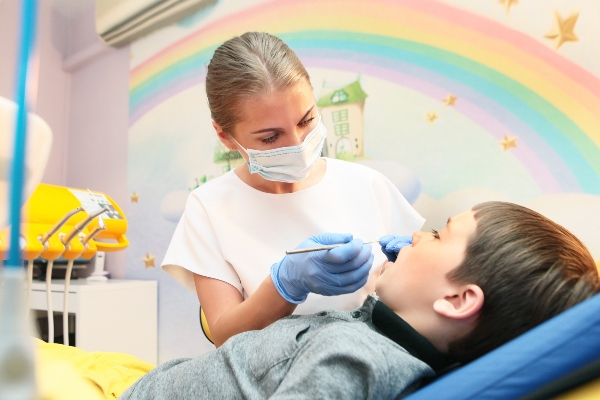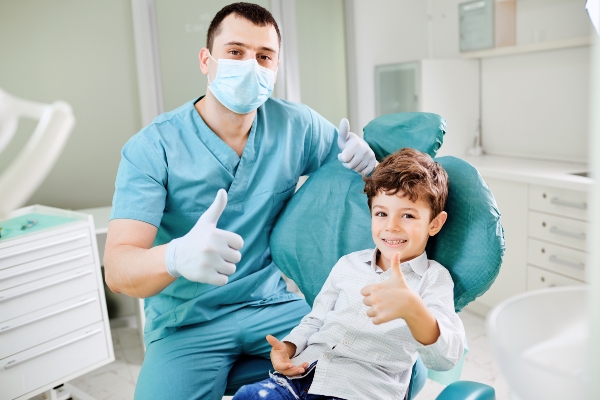Is it Common for a Pediatric Dentist To Recommend “Sleep Dentistry?”

Though a pediatric dentist may do everything possible to ensure a young patient feels comfortable during treatment, some children experience dental anxiety and phobia. This anxiety and fear often becomes more pronounced as children age. Sleep dentistry, which refers to the use of anesthesia to calm and relax a patient during treatment, often helps patients ignore their fears if not eventually overcome them. Though many pediatric dentists do use sleep dentistry, many parents wonder, is it normal to do so? If so, is it safe?
Why might a pediatric dentist recommend sleep dentistry?
A dentist would not recommend sleep dentistry if it was not absolutely necessary to do so. Typically, dentists reserve this treatment for more fearful patients. Some of these patients cannot sit still in the dental chair and end up interfering with their own health and wellbeing, while others cannot handle an easy visit the dentist. When a child is fearful enough to the point where the thought of dental care induces anxiety and dread, the dentist may recommend sleep dentistry. Some other common reasons pediatric dental professionals recommend anesthesia are as follows:
- A child is unable to stay calm or relaxed enough for the dentist to safely perform treatment
- A child needs extractions or other treatment that may be difficult to tolerate while alert
- A child needs to undergo a large amount of restorative work in one visit
- A child's disability hinders his or her ability to follow directions and undergo treatment safely
If a dentist does recommend sleep dentistry, the parent should rest assured that the recommendation comes from a place of concern and a desire to provide the child with the best possible care. The parent should also understand that dentists who specialize in this type of care have undergone extensive training and schooling to learn how to safely administer general anesthesia to young patients.
What are the risks associated with sleep dentistry and how can one mitigate them?
Like with any medical procedure, there are a few risks associated with sleep dentistry, including but not limited to nausea, vomiting, dizziness or even death. Fortunately, the majority of risks can be avoided with open and honest communication between parent and dentist.
For instance, nausea and vomiting typically only occur when a patient eats within eight hours of undergoing anesthesia. To prevent this, parents should try to schedule appointments first thing in the morning, before breakfast. Dizziness may occur if a patient receives too much anesthesia, so one should do some research and know how much is just right. The parent should make sure the dentist stays within that limit. Parents should also make sure that there is a defibrillator and supplementary oxygen in the treatment room, in the case of oxygen deprivation. Finally, parents should request that an assistant always be in the room with the child and that the system has a working alert that can notify assistant and dentist of when oxygen levels are low.
Conclusion
A pediatric dentist would not recommend sleep dentistry if they did not think it was safe or necessary to do so. However, parents should serve as informed partners and understand the risks associated with the technique as well as how to mitigate them.
Are you considering a pediatric dentist in the Richmond area? Get more information at https://www.grandparkwaypediatricdental.com.
Check out what others are saying about our services on Yelp: Read our Yelp reviews.
Recent Posts
Many children fear going to the dentist. However, a kid's dentist can transform these essential dental visits into a fun and educational experience. Through their specialized training, these dental professionals create an environment that can help alleviate fear around dental care and promote positive dental experiences for young patients.When children step into a kid's dentist's…
A child’s visit to the kids dentist does not have to be a point of contention. Many children grow to look forward to their dental appointments if they go to pediatric dentists who focus on kids because their offices are often entirely different from those that more broadly treat adults.Since children need to go to…
Seeking the help of a kids dentist to maintain your child’s oral health is a serious responsibility. As a parent, you must ensure that your child’s dentist will be able to care for your child’s general well-being. Knowing what your dentist can do for your child is a motivator to bring your child in for…
Finding the right kids dentist is important for protecting your child's oral health future. In addition to finding a skilled pediatric dentist who can build a solid rapport with your child, the location and convenience are also important. We hope this simple guide to finding a kids dentist near you simplifies your search.A kids dentist…


